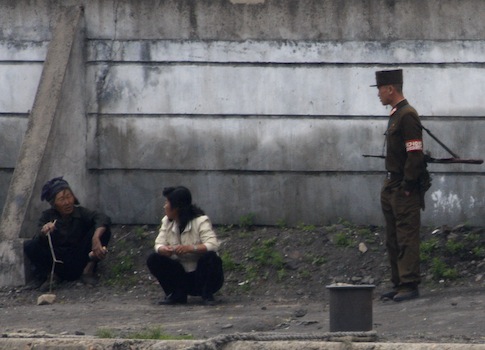Tens of thousands of North Koreans who risk their lives and the safety of their families to flee oppression face a perilous path to freedom, according to a new documentary.
The Defector: Escape from North Korea, directed by Ann Shin, chronicles the journey of a small group of North Korean women as they attempt to escape their native country and find refuge in South Korea. The women follow human smugglers or brokers through China, Laos, and Thailand, a 3,000-mile trip that can end in capture at any step.
Women like Sook-Ja first cross the freezing waters of the Tumen River bordering North Korea and China. Once in China, they seek the aid of brokers like a man who calls himself "Dragon" in the film to usher them through the country and evade seized. The next step is a 124-mile trek south through the Laotian mountains and jungle, where they are eventually guided by AK-47-wielding smugglers into Thailand.
The final leg of the journey can be the hardest. After being taken into Thai custody and hopefully securing refugee status, they often face discrimination and a lack of job opportunities in South Korea. Any initial earnings must be used to pay back their brokers.
"This is not a decision for the faint of heart," said Robert King, U.S. special envoy for human rights in North Korea, before a screening of the film at the Heritage Foundation.
King said about 2,500 North Koreans fled to South Korea in 2011 but only about 1,500 in 2012. Kim Jong-un, the current North Korean dictator who rose to power after the death of his father Kim Jong-il in 2011, has made a point of increasing border enforcement.
Greg Scarlatoiu, executive director of the Committee for Human Rights in North Korea, said about 80 percent of North Korean defectors are women. That is because of the high demand for wives among rural men in China, a byproduct of the country’s preference for males and one-child policy.
Some ethnic Koreans living in China think they are doing defectors a favor by selling them to Chinese men for thousands of dollars, Scarlatoiu said during a panel discussion after the screening.
"Even if they settle down in China they continue to face a great danger and a very insecure life," he said, adding that North Korean women are often abused by their Chinese husbands.
However, hundreds of defectors are apprehended by Chinese authorities and transferred back to North Korea before they even have a chance to stay or travel further south. Repatriated defectors are considered traitors and regularly beaten and starved at North Korea’s notorious political prison camps, or kwanlisos.
Satellite images included in a report released Wednesday by Amnesty International appear to show an increase in housing construction and potentially the prison population at Kwanliso 16, North Korea’s largest labor camp. More than a hundred thousand people are believed to be held in North Korea’s prison camp system, some children are born into detention because their family criticized the political leadership.
A former security official at Kwanliso 16 told Amnesty that he witnessed inmates digging their own graves and then being beaten with hammers by guards, as well as several women inmates who disappeared—probably executed—after they were raped by officials.
"This is not Auschwitz. This is not Stalin’s gulag. This is today—this is North Korea," said Bruce Klingner, senior research fellow at Heritage’s Asian Studies Center. North Korean officials continue to deny the existence of the camps.
The complicity of countries like China and Laos in sending defectors back to North Korea has sparked international outrage. Nine young North Koreans were told by Laotian authorities that they were being sent to South Korea and were then transported back to North Korea via China in May.
"China wants to be part of our modern world," said Carl Gershman, president of the National Endowment for Democracy, but "the forcible refoundment of refugees in this way is an outrage."
"We as a country and our government should be raising this issue all the time and not letting [China] get away with this repugnant behavior."
Shin, the director of the documentary, said the best thing the United States could do to help is expedite the refugee approval process for coming to America, like South Korea does.
"If we were able to somehow give points of juncture where North Koreans could apply for refugee status more directly, I think that would help a lot," she said.
The North Korea Freedom Coalition has created a petition calling on China to halt its forced repatriation of North Korean defectors. The group will deliver it to the Chinese Embassy on Dec. 10, International Human Rights Day.
